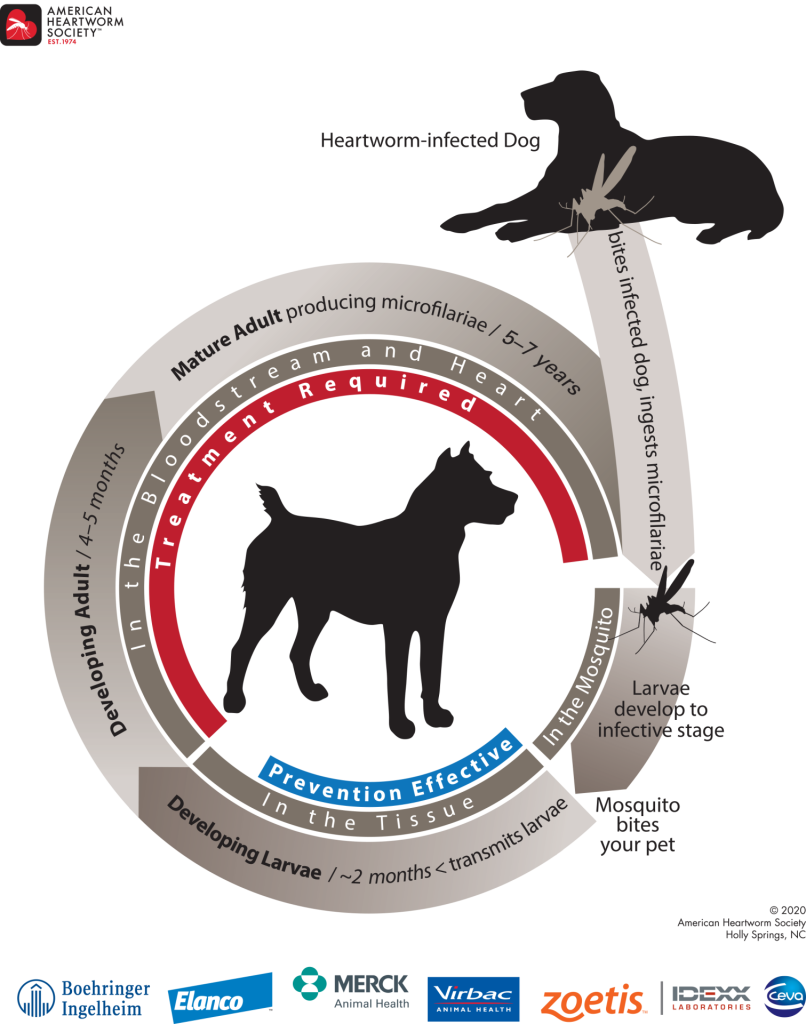The weather is getting nicer, the flowers will start blooming soon and we’re all ready for spring to finally begin! Unfortunately, spring weather brings mosquitos and other parasites that can cause problems for our pets, mainly heartworms. Heartworms are transmitted to our pets through mosquito bites. Eventually, the heartworms will migrate to the heart and lungs where they mature into adults. If left untreated, heartworm disease can be fatal. This means prevention is key! Dr. Rhiannon Koehler, shelter veterinarian at Great Plains SPCA, is busting heartworm prevention myths and offering advice about protecting pets from the dangers of heartworms.
Common Heartworm Myths

Myth #1: Indoor pets don’t need heartworm prevention.
FALSE! It only takes one infected mosquito flying into your home to infect your indoor pets with heartworms. In the United States, around 27% of infected cats are indoor only, which leads us to our next myth…
Myth #2: Cats can’t get heartworms.
FALSE! While cats are considered atypical hosts for heartworms, they can still be infected. Infected cats often only have one to three adult heartworms, but this doesn’t mean the disease is any less serious! Symptoms in cats can include intermittent vomiting, coughing, asthma-like episodes, fainting, seizures and even sudden death. Cats can develop a severe and potentially fatal pulmonary reaction to the death of immature or mature heartworms. 10-20% of heartworm positive cats will die from their disease, making prevention important for our feline friends too!
Myth #3: There is NO realistic treatment for heartworm disease in cats.
TRUE! There is no approved medical treatment for killing adult heartworms in cats. Dogs can receive a very expensive and painful injection called melarsomine that kills adult heartworms. However, due to the cat’s tendency to have an extreme inflammatory reaction to adult worms dying, this is not an option for cats. We can use steroids to reduce inflammation, but the best we can do is manage symptoms while we hope that the pet self-cures without too many complications. Your best bet is to prevent your cat from getting infected in the first place!
Myth #4: Heartworms are only an issue in the warm months.
FALSE! Mosquito season varies from area to area and year to year. Some mosquitoes are active when the temperature is in the 40s, and some hibernating mosquitoes emerge during abnormal warm spells in the winter.
Myth #5: Heartworms aren’t an issue in our area.
FALSE! Heartworms have been found in all 50 states. There are areas that have higher incidence of heartworms, mostly along the Atlantic and Gulf Coasts and along rivers, and some states have “hot spots” where incidence is higher than in other areas of the state. In 2019, the Companion Animal Parasite Council reported that Overland Park, Kansas was the top city for the highest increase in heartworm incidence!
Myth #6: If my pet is on heartworm prevention, they don’t need flea and tick prevention.
BOTH TRUE AND FALSE! This depends on the specific product that you are using. Some preventatives, such as Advantage Multi, can prevent heartworms and fleas but do not prevent ticks. Simparica Trio can prevent heartworms, flea, and ticks. There are many options, and we recommend working with your veterinarian to find the best product or combination of products for you and your pet.
Myth #7: My pet doesn’t have heartworms because I can’t see the heartworms in their feces.
FALSE! You will not see heartworms in a positive pet’s stools. Adult heartworms live in the heart and lungs, so they will not come out in the feces. If you are seeing worms in your pet’s stool, they may have a different parasite such as a roundworm or tapeworm. Most heartworm cases are confirmed through a blood test. We recommend you contact your veterinarian for further evaluation.
What does this all mean for my pet?
We recommend year-round heartworm prevention for all dogs and cats. Before more mosquitoes emerge this spring, let’s get ahead of the tide and get our pets on prevention! Heartworm prevention can only be purchased with a prescription, and most veterinarians will require a negative heartworm test prior to beginning heartworm prevention. We recommend visiting your veterinarian to get your pet started on heartworm prevention and to maintain preventative care year-round. At Great Plains SPCA, we sell flea and tick prevention in our retail store, some of which do not require a prescription. Feel free to stop by and chat with us about the options we have for your pets!

